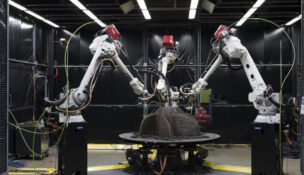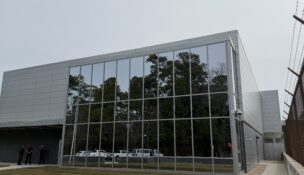HII’s CEO doesn’t expect major defense spending cuts under Trump
President said last week he might halve defense spending
Kate Andrews //February 18, 2025//

Newport News Shipbuilding workers construct steel panels for aircraft carriers at the company’s new satellite campus at Fairwinds Landing in Norfolk. Photo by Ashley Cowan/Huntington Ingalls Industries

Newport News Shipbuilding workers construct steel panels for aircraft carriers at the company’s new satellite campus at Fairwinds Landing in Norfolk. Photo by Ashley Cowan/Huntington Ingalls Industries
HII’s CEO doesn’t expect major defense spending cuts under Trump
President said last week he might halve defense spending
Kate Andrews //February 18, 2025//
President Donald Trump‘s suggestion last week that he could cut U.S. defense spending in half spooked the stock market — but the CEOs of Virginia’s Huntington Ingalls Industries and Science Applications International Corp. are taking Trump’s statement in stride.
Thursday afternoon, Trump said, “One of the first meetings I want to have is with President Xi of China and President Putin of Russia, and I want to say, ‘Let’s cut our military budget in half.’ And we can do that, and I think we’ll be able to do that.”
Shares of Virginia-based Fortune 500 aerospace and defense contractors Northrop Grumman and General Dynamics dropped following the president’s statement.
But HII President and CEO Christopher Kastner said Tuesday at a Florida tech conference he doesn’t expect China, Russia and the United States to all come together on such an initiative, or for the U.S. to slash defense spending by half.
“I’m all for world peace, but I think … it’s not really realistic to assume that’s going to happen,” Kastner said, speaking at Citi’s 2025 Global Industrial Tech and Mobility Conference in Miami. “I don’t see it unless peace breaks out somewhere.”
Toni Townes-Whitley, CEO of Reston-based SAIC, said at the Citi conference that in 2024, her Fortune 500 company pivoted its portfolio toward “more mission and enterprise IT,” a more reliable business model, no matter what new priorities take hold in the White House.
With Trump returning for a second term, she added, “it just so happens that that type of portfolio also plays well in this environment. So, I’m pleased that we did the strategy last year, and that we’re actually just executing it now.” She noted that SAIC has a $19 billion backlog of projects.
Moreover, SAIC has witnessed only “nominal disruption” to regular business in the first month of the Trump administration, Townes-Whitley said. Kastner, meanwhile, noted that HII and subsidiary Newport News Shipbuilding are working to fulfill their current Navy contracts while waiting for the next secretary of the Navy to go through the U.S. Senate confirmation process. John Phelan, a Florida businessman with no military experience, is the president’s pick for the job. (While unusual, that’s not unprecedented. Twenty of the 26 naval secretaries confirmed since 1955 have been veterans, according to Military Times.)
Kastner did acknowledge the Trump administration’s greater speed than typically associated with the federal government — particularly with regard to world’s richest man Elon Musk’s Department of Government Efficiency (DOGE), which has been tasked with making massive federal workforce and spending cuts.
Asked what recommendation he would make to DOGE, Kastner said, “Every person in my position can recognize going into a Pentagon meeting and seeing a lot of chairs around the table with people in them, but you’re not sure what their job is. Simplifying the oversight of the Pentagon would be positive.”
So far, DOGE’s focus has been on agencies and departments outside of the Pentagon, including the U.S. Agency for International Development, the Department of Education, the Consumer Financial Protection Bureau and the FBI. However, the Department of Defense is already preparing for DOGE aides’ arrival, including making lists of weapons that defense officials would like to see canceled, The Wall Street Journal reported.
Last week, more than 200,000 federal employees in probationary periods — people who had started roles less than a year ago, or less than two years in “excepted service” positions — were fired. They included employees of the U.S. Forest Service, the Department of Energy and the Office of Personnel Management, according to The Wall Street Journal.
“I’ve long supported our strong national defense, and have worked to secure critical funding to equip our nation’s military, provide for our veterans and strengthen our national security,” U.S. Sen. Mark Warner, Virginia’s senior Democratic senator, said this week. “Now, I do encourage conversations to ensure that our defense spending is actually meeting the emerging needs of our military, but what we’ve seen from the Trump administration and Elon Musk’s DOGE thus far has simply been reckless and ineffective. If they continue on this path that seems entirely devoid of a reasoned strategy, they will hurt our defense workforce in Virginia, and hurt our national security.”
However, Townes-Whitley said she feels secure in SAIC’s federal government customer base. “We are leaning in heavily with our customers to understand how they’re feeling relative to budget and funding. They’re obviously concerned about a [potential government] shutdown or a yearlong [continuing resolution].”
Without a new federal budget passed by Congress by March 14, new programs’ start dates will be delayed.
Nonetheless, Townes-Whitley added, SAIC is focused on integrating new technologies into government agencies’ existing systems, a need that she says will exist in the new administration.
“As an integrator, our goal is to ensure that commercial providers — whether they’re new tech, defense or literally part of our industrial base — that they are building in a manner that we can integrate quickly,” she said. “At the end of the day, it isn’t just about bringing great tech. It almost doesn’t matter how good the tech is, if it doesn’t integrate into the mission environment, if it doesn’t connect with coalition or allied partners. None of our fights are solo fights at this point.”
Uncertainty for now
Jerry McGinn, executive director of George Mason University‘s Baroni Center for Government Contracting at its Costello College of Business, said Tuesday that “there’s a lot of uncertainty right now,” including all types of government contracting and priorities under Trump in his second term.
“Right now, there’s a great amount of disruption,” he said. “That can’t continue forever. Some of this disruption and turbulence will level out and move in different directions. I think by the summertime, you’ll have a better picture of where the administration is building and putting their principal efforts.”
A few things that govcon firms in general can count on is that “spending around DEI or alternative energy, I would expect to stop immediately,” McGinn said. Defense spending priorities are a bit fuzzier, though.
“The idea of 50% defense spending cuts would require China and Russia to agree, and that’s almost zero chance,” McGinn said, and he would expect the Trump administration to want any new weapons or battlefield technology to reach the field faster, although “that’s been the theme for the past five or six years” under former President Joe Biden as well.
Possibly there will be more focus on small drones and unmanned systems in defense, as well as the possibility of a U.S. Iron Dome, which Trump ordered the Pentagon to prioritize in an executive order in January, although it would require a budget change. If an Iron Dome — missile defense technology pioneered by Israel with $1.6 billion in U.S. funding — is built in the United States, that would be beneficial for “lots of government contractors” in Virginia, McGinn said.
Townes-Whitley said that the Iron Dome “by definition is an integration project. We’ve been collecting space sensor data, ground sensor data. It’s … integration of not just data but secure data at every level of security across multiple countries. We feel like we’re positioned to support [it] because of the work we do in Space Force, the Air Force and combat demands.”
Kastner called Israel’s Iron Dome a “fabulous technology. It would be great to have it, but I think it’s a ways away” for the United States.
t

















